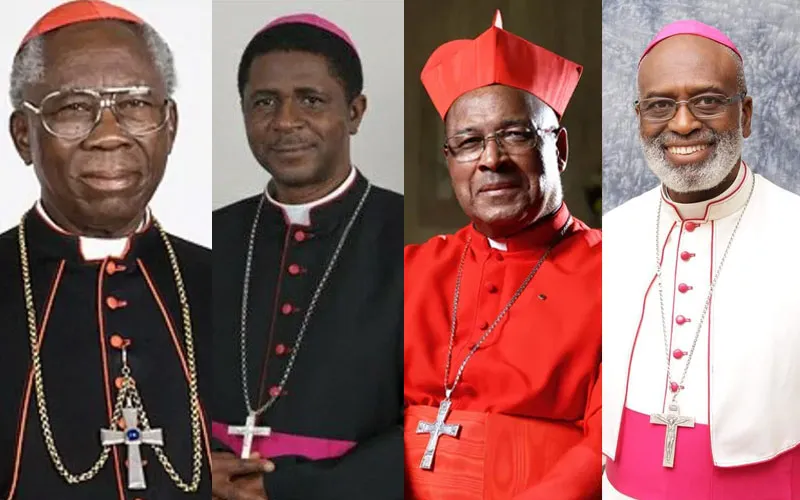Because of the great respect African Bishops have for Church authority and the Holy Father, he said he would expect even more outspokenness from the continent regarding German Synodal Path, if it was perceived as going against the intentions of Pope Francis and threatening Church unity.
In the letter, the Catholic Church leaders from 10 countries say the German Synodal Path “reflects a widespread form of Church sclerosis and, ironically, becomes anti-evangelical in tone.”
“The Synodal Path’s focus on ‘power’ in the Church suggests a spirit fundamentally at odds with the real nature of Christian life. Ultimately the Church is not merely an ‘institution’ but an organic community; not egalitarian but familial, complementary, and hierarchical -- a people sealed together by love of Jesus Christ and love for each other in his name,” they say.
The Catholic Bishops who include 14 from the East African nation of Tanzania continue about the German Synodal Path, “The reform of structures is not at all the same thing as the conversion of hearts. The encounter with Jesus, as seen in the Gospel and in the lives of the saints throughout history, changes hearts and minds, brings healing, turns one away from a life of sin and unhappiness, and demonstrates the power of the Gospel.”
“As you discern the Lord’s will for the Church in Germany, be assured of our prayers for you,” the signatories to the letter dated April 11 say.
(Story continues below)
Below is the list of signatories to the April 11 letter shared with ACI Africa
Cardinal Francis Arinze (Onitsha, Nigeria)
Cardinal Raymond Burke (archbishop emeritus of St. Louis, Missouri, USA)
Cardinal Wilfred Napier (archbishop emeritus of Durban, South Africa)
Cardinal George Pell (archbishop emeritus of Sydney, Australia)
Archbishop Samuel Aquila (Denver, Colorado, USA)
Archbishop Emeritus Charles Chaput (Philadelphia, Pennsylvania, USA)
Archbishop Paul Coakley (Oklahoma City, Oklahoma, USA)
Archbishop Salvatore Cordileone (San Francisco, California, USA)
Archbishop Damian Dallu (Songea, Tanzania)
Archbishop Emeritus Joseph Kurtz (Louisville, Kentucky, USA)
Archbishop J. Michael Miller (Vancouver, British Columbia, Canada)
Archbishop Joseph Naumann (Kansas City, Kansas, USA)
Archbishop Andrew Nkea (Bamenda, Cameroon)
Archbishop Renatus Nkwande (Mwanza, Tanzania)
Archbishop Gervas Nyaisonga (Mbeya, Tanzania)
Archbishop Gabriel Palmer-Buckle (Cape Coast, Ghana)
Archbishop Emeritus Terrence Prendergast (Ottawa-Cornwall, Ontario, Canada)
Archbishop Jude Thaddaeus Ruwaichi (Dar-es-Salaam, Tanzania)
Archbishop Alexander Sample (Portland, Oregon, USA)
Bishop Joseph Afrifah-Agyekum (Koforidua, Ghana)
Bishop Michael Barber (Oakland, California, USA)
Bishop Emeritus Herbert Bevard (St. Thomas, American Virgin Islands)
Bishop Earl Boyea (Lansing, Michigan, USA)
Bishop Neal Buckon (Auxiliary, Military Services, USA)
Bishop William Callahan (La Crosse, Wisconsin, USA)
Bishop Emeritus Massimo Camisasca (Reggio Emilia-Guastalla, Italy)
Bishop Liam Cary (Baker, Oregon, USA)
Bishop Peter Christensen (Boise, Idaho, USA)
Bishop Joseph Coffey (Auxiliary, Military Services, USA)
Bishop James Conley (Lincoln, Nebraska, USA)
Bishop Thomas Daly (Spokane, Washington, USA)
Bishop John Doerfler (Marquette, Michigan, USA)
Bishop Timothy Freyer (Auxiliary, Orange, California, USA)
Bishop Donald Hying (Madison, Wisconsin, USA)
Bishop Emeritus Daniel Jenky (Peoria, Illinois, USA)
Bishop Stephen Jensen (Prince George, British Columbia, Canada)
Bishop William Joensen (Des Moines, Iowa, USA)
Bishop James Johnston (Kansas City-St. Joseph, Missouri, USA)
Bishop David Kagan (Bismarck, North Dakota, USA)
Bishop Flavian Kassala (Geita, Tanzania)
Bishop Carl Kemme (Wichita, Kansas, USA)
Bishop Rogatus Kimaryo (Same, Tanzania)
Bishop Anthony Lagwen (Mbulu, Tanzania)
Bishop David Malloy (Rockford, Illinois, USA)
Bishop Gregory Mansour (Eparchy of Saint Maron of Brooklyn, New York, USA)
Bishop Simon Masondole (Bunda, Tanzania)
Bishop Robert McManus (Worcester, Massachusetts, USA)
Bishop Bernadin Mfumbusa (Kondoa, Tanzania)
Bishop Filbert Mhasi (Tunduru-Masasi, Tanzania)
Bishop Lazarus Msimbe (Morogoro, Tanzania)
Bishop Daniel Mueggenborg (Reno, Nevada, USA)
Bishop William Muhm (Auxiliary, Military Services, USA)
Bishop Thanh Thai Nguyen (Auxiliary, Orange, California, USA)
Bishop Walker Nickless (Sioux City, Iowa, USA)
Bishop Eusebius Nzigilwa (Mpanda, Tanzania)
Bishop Thomas Olmsted (Phoenix, Arizona, USA)
Bishop Thomas Paprocki (Springfield, Illinois, USA)
Bishop Kevin Rhoades (Fort Wayne-South Bend, Indiana, USA)
Bishop David Ricken (Green Bay, Wisconsin, USA)
Bishop Almachius Rweyongeza (Kayanga, Tanzania)
Bishop James Scheuerman (Auxiliary, Milwaukee, Wisconsin, USA)
Bishop Augustine Shao (Zanzibar, Tanzania)
Bishop Joseph Siegel (Evansville, Indiana, USA)
Bishop Frank Spencer (Auxiliary, Military Services, USA)
Bishop Joseph Strickland (Tyler, Texas, USA)
Bishop Paul Terrio (St. Paul in Alberta, Canada)
Bishop Thomas Tobin (Providence, Rhode Island, USA)
Bishop Kevin Vann (Orange, California, USA)
Bishop Robert Vasa (Santa Rosa, California, USA)
Bishop David Walkowiak (Grand Rapids, Michigan, USA)
Bishop James Wall (Gallup, New Mexico, USA)
Bishop William Waltersheid (Auxiliary, Pittsburgh, Pennsylvania, USA)
Bishop Michael Warfel (Great Falls-Billings, Montana, USA)
Bishop Chad Zielinski (Fairbanks, Alaska, USA)
Jude Atemanke is a Cameroonian journalist with a passion for Catholic Church communication. He holds a Bachelor’s Degree in Journalism and Mass Communication from the University of Buea in Cameroon. Currently, Jude serves as a journalist for ACI Africa.








